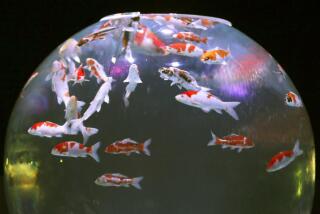Japan Makes Nice on Rice: A Portent?
- Share via
Tokyo’s vexing and longstanding ban against rice imports may face its biggest test ever: hungry consumers.
Foreign-grown rice will be allowed into Japan on a limited, emergency basis because of this year’s poor domestic harvest. There’s nothing to indicate that this is a permanent change in the controversial and much-criticized rice import ban. But this crack in the rice wall just might produce the political leverage needed to open Japan’s rice market.
That would suit Japan’s trading partners, particularly the United States. Tokyo has been repeatedly criticized for its intransigence on the rice issue, which has come to symbolize Japan’s closed markets. The last time Japan imported rice was in 1984, when it bought a small amount from South Korea under an emergency reciprocal purchase agreement.
This time, Tokyo will import more than 1 million tons of rice--about 10% of annual consumption--because heavy rains and an unusually cool summer have cut the nation’s rice harvest 20% from normal levels. One-third of the imports will be lower-grade rice from Thailand, to be used for processed foods such as rice cakes, miso and sake. The other two-thirds will be higher-grade table rice from the United States and Australia.
California growers have long sought an opening to put their grain on Japanese tables. The farmers, who grow the japonica short- and medium-grain rice that the Japanese eat, are enjoying what is expected to be their second-largest crop since the early 1980s. Exchange rates also work to the price advantage of American rice. Japanese consumers pay eight times what Americans do for the same type of rice. A critical question is whether Japanese middlemen will pass on the savings to consumers.
Japanese consumers who find that the American grain suits their palate and their pocketbook may rebel against the top-down mandate against foreign rice. Status quo-minded Japanese politicians have long protected rice farmers, who hold a disproportionate grip on the political process.
A consumer backlash may do for rice imports what a voter backlash did for Prime Minister Morihiro Hosokawa--open up the nation’s political system to change. Tokyo officially still opposes lifting the rice ban, but Hosokawa has hinted that Japan might agree to more imported rice by December when the Uruguay Round of world trade talks is to conclude.
A crack in the ban now, under an emergency order, may be expanded into a means for Tokyo to gracefully assume a new rice policy, one that better serves Japanese consumers and the world trading community.
More to Read
Inside the business of entertainment
The Wide Shot brings you news, analysis and insights on everything from streaming wars to production — and what it all means for the future.
You may occasionally receive promotional content from the Los Angeles Times.










